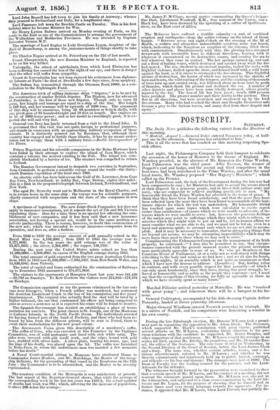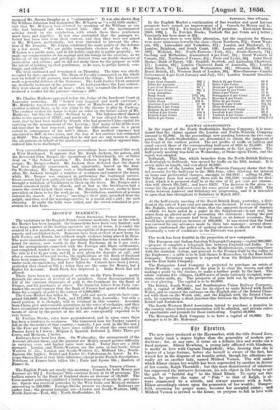During the late Edinburgh election, Mr. Duncan M‘Laren took a
promi- nent part in organizing the opposition to Mr. Adam Black. The Scoteman, which supported Mr. Black's nomination with great vigour, published several attacks on Mr. M‘Laren, containing biting allusions to his pre- vious relations with the candidate he supported, Mr. Brown Douglas, and other supporters of that gentleman. Mr. M‘Laren sought his revenge in an action for libel, against Mr. Ritchie, the proprietor, and Mr. Alexander Rus- sel, the editor of the Scotsman. The case came to trial on Wednesday, in the Second Division of the Court of Session, before the Lord Justice Clerk and a Jury. The issue was, whether certain articles, verses, and a fic- titious advertisement, referred to Mr. II‘Laren ; and whether he was thereby calumniously and injuriously held up to public hatred, contempt, and ridicule—to his loss and damage. The damages were laid at 10001. The Dean of Faculty was the leading counsel for the pursuer, and the Lord- Advocate for the defender.
The witnesses brought forward by the prosecution were examined to show that a certain speech of Mr. MeLaren, and his conduct at a meeting, did not warrant the comments passed upon them. Mr. BPLaren was also put in the witness-box, and subjected to a close cross-examination by the Lord Ad- vocate and Mr. Logan, for the purpose of showing that he himself had in former times used very strong language towards his opponents. For in- stance, it appeared that Mr. M‘Laren, when Lord Provost, had publicly de- nounced Mr. Brown Douglas as a "calumniator." It was also shown that Sir William Johnston had designated Mr. bi'Laren as "a cold little snake," and that Mr. IPLaren had retorted by speaking of Sir William as one who had betrayed all who trusted him. One of the incriminated articles dwelt on the satisfaction with which these three gentlemen must have met together. It was also contended that the passages se- lected had been torn from their context, and that they were not aimed at Mr. M‘Laren particularly, but were intended to prevent the elec- tion of Mr. Douglas. Mr. Logan condensed the main points of the defence in a few words. "We are public journalists, electors of the city ; Mr. 21'Laren is a public man, and in his public capacity is public property ; we made our commentaries on his sayings and his doings in the exercise, as we believed, of the rights and privileges derived from our double character of journalism and eivism ; and we did not make them for the purpose or with the intent of holding up that gentleman, as he says, to public hatred, con- tempt, and ridicule." The trial continued and terminated on Thursday. The time was chiefly occupied by three speeches. The Dean of Faculty commented on the whole case on behalf of the pursuer, and enforced the charge. The Lord Advocate made a powerful defence of the Scotsman. The Lord Justice Clerk summed up, decidedly in favour of the pursuer. At half-past three the Jury retired ; they were absent only half an hour ; when they returned the Foreman an- nounced a verdict for the pursuer—damages 400/.



































 Previous page
Previous page